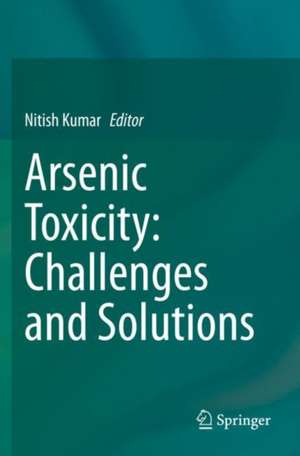Arsenic Toxicity: Challenges and Solutions
Editat de Nitish Kumaren Limba Engleză Paperback – 17 feb 2022
The book covers sources of arsenic contamination, and its impact on human health and on prospective remediation both by bioremediation and phytoremediation. Applications of advance techniques such as genetic engineering and nanotechnology are also discussed to resolve the issue of arsenic contamination in ground water and river basins. The book sheds light on thisglobal environmental issue, and proposes solutions to remove contamination through a multi-disciplinary lens and case studies from Bangladesh and India.
The book may serve as a reference to environment and sustainability researchers, students and policy makers. It delivers an outline to graduate, undergraduate students and researchers, as well as academicians who are working on arsenic toxicity with respect to remediation and health issues.
| Toate formatele și edițiile | Preț | Express |
|---|---|---|
| Paperback (1) | 1197.48 lei 38-44 zile | |
| Springer Nature Singapore – 17 feb 2022 | 1197.48 lei 38-44 zile | |
| Hardback (1) | 1390.89 lei 3-5 săpt. | |
| Springer Nature Singapore – 16 feb 2021 | 1390.89 lei 3-5 săpt. |
Preț: 1197.48 lei
Preț vechi: 1575.63 lei
-24% Nou
Puncte Express: 1796
Preț estimativ în valută:
229.16€ • 248.84$ • 192.50£
229.16€ • 248.84$ • 192.50£
Carte tipărită la comandă
Livrare economică 19-25 aprilie
Preluare comenzi: 021 569.72.76
Specificații
ISBN-13: 9789813360709
ISBN-10: 9813360704
Pagini: 413
Ilustrații: VII, 413 p. 69 illus., 57 illus. in color.
Dimensiuni: 155 x 235 mm
Ediția:1st ed. 2021
Editura: Springer Nature Singapore
Colecția Springer
Locul publicării:Singapore, Singapore
ISBN-10: 9813360704
Pagini: 413
Ilustrații: VII, 413 p. 69 illus., 57 illus. in color.
Dimensiuni: 155 x 235 mm
Ediția:1st ed. 2021
Editura: Springer Nature Singapore
Colecția Springer
Locul publicării:Singapore, Singapore
Cuprins
Chapter 1. Predicting the outcome of Arsenic Toxicity on exposed juvenile male-humans: a shift to infertility.- Chapter 2. Arsenic and oxidative stress: an overview.- Chapter 3. Arsenic in seafood: current status, analysis and toxicity.- Chapter 4. Dietary Arsenic Exposure: Sources and Risks.- Chapter 5. Effects of arsenic: neurological and cellular perspective.- Chapter 6. Arsenic Toxicity: Source, Distribution and Bioremediation.- Chapter 7. Assessment of Arsenic contamination in groundwater and affected population of Bihar.- Chapter 8. Current scenario of groundwater arsenic contamination in West Bengal and its mitigation approach.- Chapter 9. Low Cost Nanoparticles for Remediation of Arsenic Contaminated Water and Soils.- Chapter 10. Biological Means of Arsenic Minimisation with Special Reference to Siderophore.- Chaper 11. Mechanisms of arsenic transport, accumulation and distribution in rice grains.- Chapter 12. The healing art of arsenic in various malignancies.- Chapter 13. Removal of arsenic from contaminated water using nanoadsorbents.- Chapter 14. Understanding the bioaccumulation and biosorption of arsenic [As(III)] in plants and biotechnological approaches for its bioremediation.- Chapter 15. Genes and Biochemical Pathways involved in Microbial Transformation of Arsenic.
Notă biografică
Nitish Kumar is a Senior Assistant Professor at the Department of Biotechnology, Central University of South Bihar, Gaya, Bihar, India. He received his Master’s Degree in Agricultural Biotechnology from Himachal Pradesh Agricultural University, Palampur in 2003 and his PhD in Botany from Bhavnagar University in 2009. Dr. Kumar is currently a plant biologist with a focus on Microbial Biotechnology , Plant Tissue Culture, Molecular Marker Development, and Transgenic Technology. He has published a number of research papers in peer-reviewed journals of national and international repute. In addition, he has received many awards \fellowships from various organizations, e.g. the CSIR, DBT, ICAR, and DST. He is an associate editor of the journal GENE.
Textul de pe ultima copertă
Arsenic (As) is a widely distributed element in the environment having no known useful physiological function in plants or animals. Historically, this metalloid has been known to be used widely as a poison. Effects of arsenic have come to light in the past few decades due to its increasing contamination in several parts of world, with the worst situation being in Bangladesh and West Bengal in India. This edited volume brings together diverse group of environmental science, sustainability and health researchers to address the challenges posed by global mass poisoning caused by arsenic water contamination.
The book covers sources of arsenic contamination, and its impact on human health and on prospective remediation both by bioremediation and phytoremediation. Applications of advance techniques such as genetic engineering and nanotechnology are also discussed to resolve the issue of arsenic contamination in ground water and river basins. The book sheds light on this globalenvironmental issue, and proposes solutions to remove contamination through a multi-disciplinary lens and case studies from Bangladesh and India.
The book may serve as a reference to environment and sustainability researchers, students and policy makers. It delivers an outline to graduate, undergraduate students and researchers, as well as academicians who are working on arsenic toxicity with respect to remediation and health issues.
The book may serve as a reference to environment and sustainability researchers, students and policy makers. It delivers an outline to graduate, undergraduate students and researchers, as well as academicians who are working on arsenic toxicity with respect to remediation and health issues.
Caracteristici
Covers all the sources of arsenic toxicity and its distribution Explains the mechanism of arsenic toxicity on human health Discusses all possible solution of arsenic remediation such as bioremediation, genetic engineering and nanotechnology
